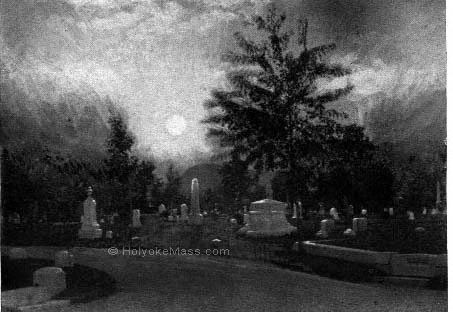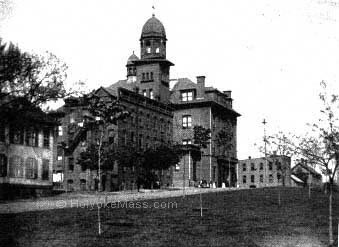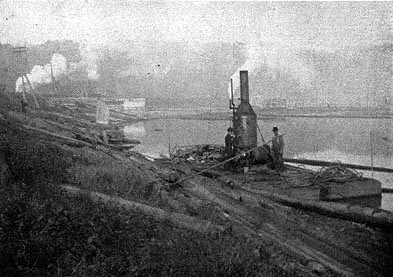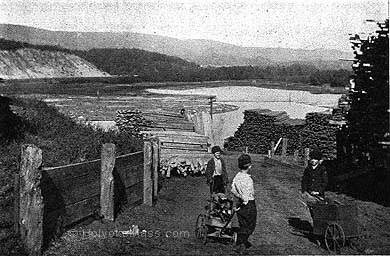
Moonlight, Forestdale Cemetery.
|
Some distance to the northward is the proposed "Mountain Park." In going to it you leave Northampton street just where it dips down into the northern valley, which opens away with a beautiful view of river and meadows and bordering mountain ranges, and take a narrow road leading into the woods. It is a well-kept, winding way, with a little stream at the right, and is nearly closed in with young woods, broken now and then with a larger tree shooting above the rest. Soon the gentle rise brings one in sight of the little brick gatehouse at the Whiting Street reservoir. Above is a small pond, and about and beyond, boggy meadows dotted with stumps. Across this level is built a long, strange-looking wall of stone, whitened by limy oozings. Above it is imprisons an expanse of water, whose waves, whenever the wind is stirring, ripple with monotonous fretting against the stony barrier. Mt. Tom’s massive range shuts out the west, and low hills slant down from the wooded mountain and almost encircle the little lake. Below, the land falls away in a gradual slope, and over the fringe of trees bordering the meadows is caught a glimpse of Holyoke’s roofs and spires and curling ribbons of smoke.
Near this reservoir is an old cellar hole and a few bushy old apple trees that show here once stood a farmhouse, and if inquiry is pursued it is ascertained that Moses Pomeroy, a hundred years since, owned this property and lived here with a numerous family. Among other traditions of the place which still linger, is one having to do with a certain jug Moses carried to the village store with considerable regularity to be filled with rum. One dark night he returned laden with this jug and came opposite the marsh, when he was startled by gutteral voices from the pond, crying out, "Pomeroy! Pomeroy! Jug o’rum! jug o’rum! Got drunk! got drunk! Go home! Go home!" These remarks so worked on his mind that he said to himself, "If the very frogs have got so as to mock me and say that I am drunk, I will stop drinking." And he swung his jug in air and threw it far out into the pond.

French Catholic Church of Perpetual Help.
|
A rough road leads about the northern end of the lake, and in whichever way you choose to turn is interesting tramping ground. The near land is broken and varied; an immense sweep if eastern valley opens before the eyes from all the higher points, and north and south are long views of no less interest. If one cares to climb among the trees and boulders of the mountain range, he can see Nature in some of her wildest aspects, and will find many delightful little cascades making silvery plunges down the rocky hollows.
Instead of going directly back to the city, we will turn off from lower Northampton street and go over the high hills to the region known as "Back street." It is a farming district, and was once a chief center of population in the town. There are only a few scattered houses here, but one of them is notable as having been the residence of Elder Rand, Holyoke’s first minister, a man of strong character and individuality, who still lives in the memory of the older people of the city. The house is a low, gray old building, shadowed by great trees that spring up close by its walls. Mr. Rand as a young man learned the tailor’s trade, and at the same time he turned preacher he said, "I could then make ten dollars a week as a tailor, but as a preacher I traveled on foot each year hundreds of miles, and did not receive money enough to keep me in shoes." During the first years of his ministry in Holyoke, Mr. Rand received a salary of $200, which was later increased to $400. It was customary the, as it is now in our country towns, for the farmers when they butchered to send in a piece of meat to their minister, or, fields, to send some of these products. But the privilege was reserved in case a "donation" exceeded in value fifty cents, of charging it as part of the minister’s salary. In order to make both ends meet, Mr. Rand, besides his preaching, carried on a farm, taught the village academy and took certain of the pupils as boarders. The school building stood close below the Rand home, and pupils came from three miles about. The academy was a classical school that fitted those who chose for college.

The River Engine at the Steam Sawmills.
|

In the Yard of the Sawmills.
|
© Laurel O’Donnell 1996 - 2006, all rights reserved
This document may be downloaded for personal non-commercial use only
and may not be reproduced or distributed without permission in any format.
This is an edited adaptation from the original publication.
|